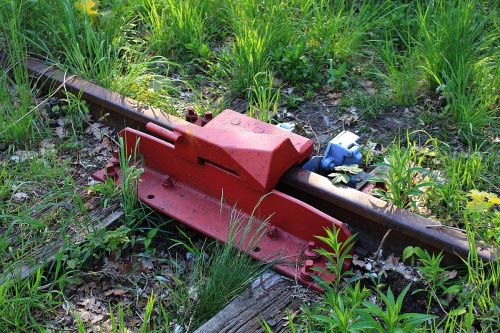|
|
| Line 2: |
Line 2: |
|
| |
|
|
| |
|
| [[File:1200px-Bahnhof Schildow Gleissperre.jpg|thumb|500px|{{external|1=https://commons.wikimedia.org/wiki/File:Bahnhof_Schildow_Gleissperre.jpg|2=Derailer}} by {{external|https://unsplash.com/@ballaschottner|Sebastian Rittau}} via Wikimedia Commons | | [[File:1200px-Bahnhof Schildow Gleissperre.jpg|thumb|500px|{{external|1=https://commons.wikimedia.org/wiki/File:Bahnhof_Schildow_Gleissperre.jpg|2=Derailer}} by {{external|https://commons.wikimedia.org/wiki/User:Srittau|Sebastian Rittau}} via Wikimedia Commons |
| Free to use under the {{external|https://creativecommons.org/public-domain/cc0/|CC0}} ]] | | Free to use under the {{external|https://creativecommons.org/public-domain/cc0/|CC0}} ]] |
|
| |
|
Revision as of 16:30, 11 April 2024
Introduction
Documentation
Syntax
Autoexport from the XML-Schema for element IS:derailerIS of railML ® version 3.3 |
| Documentation
|
Allows specifying devices used to prevent fouling (blocking or compromising) of a rail track (or collision with anything present on the track, such as a person, or a train) by unauthorized movements of trains or unattended rolling stock.
|
| Subschema
|
infrastructure
|
| Parents*
|
derailersIS
|
| Children
|
areaLocation (0..*), designator (0..*), elementState (0..*), gmlLocation (0..*), isValid (0..*), linearLocation (0..*), name (0..*), networkLocation (0..*), spotLocation (0..*), typeDesignator (0..*)
|
Attributes:
- constructionType: type of derailer from infrastructure/construction perspective (optional;
xs:string)
- Possible values:
- blockDerail: A block or wedge that fits over the rail. It will lift the flange of the wheel over to the outside of the rail.
- doubleCatchPoint: Deflects vehicles in the same manner as a switch, with two tongues, one on each rail.
- singleCatchPoints: Deflects vehicles in a similar manner as a switch, but with only a single tongue, in the rail through which the flanges have to pass.,
- derailSide: the side to which the railway vehicle will be derailed in reference to the application direction of the derailer: possible values are left and right (optional;
xs:string)
- Possible values:
- left: the railway vehicle will be derailed to the left side in reference to the application direction of the derailer
- right: the railway vehicle will be derailed to the left side in reference to the application direction of the derailer,
- id: the identifier of the object; this can be either of type xs:ID or UUID (obligatory;
xs:ID); compare: Dev:Identities
|
*Notice:
Elements may have different parent elements. As a consequence they may be used in different contexts.
Please, consider this as well as a user of this wiki as when developing this documentation further.
Aspects that are only relevant with respect to one of several parents should be explained exclusively in the documentation of the respective parent element.
|
Autoexport from the XML-Schema for element IS:derailerIS of railML ® version 3.2 |
| Documentation
|
Allows specifying devices used to prevent fouling (blocking or compromising) of a rail track (or collision with anything present on the track, such as a person, or a train) by unauthorized movements of trains or unattended rolling stock.
|
| Subschema
|
infrastructure
|
| Parents*
|
derailersIS
|
| Children
|
areaLocation (0..*), designator (0..*), external (0..*), gmlLocations (0..*), isValid (0..*), linearLocation (0..*), name (0..*), networkLocation (0..*), spotLocation (0..*), typeDesignator (0..*)
|
Attributes:
- derailSide: the side to which the railway vehicle will be derailed in reference to the application direction of the derailer: possible values are left and right (optional;
xs:string)
- Possible values:
- left: the railway vehicle will be derailed to the left side in reference to the application direction of the derailer
- right: the railway vehicle will be derailed to the left side in reference to the application direction of the derailer,
- type: type of derailer from infrastructure/construction perspective (optional;
xs:string)
- Possible values:
- doubleDerailer: two derail devices installed on two rails
- singleDerailer: one derail device installed on one rail,
- id: the identifier of the object; this can be either of type xs:ID or UUID (obligatory;
xs:string; patterns: (urn:uuid:)?[0-9a-fA-F]{8}-[0-9a-fA-F]{4}-[0-9a-fA-F]{4}-[0-9a-fA-F]{4}-[0-9a-fA-F]{12}|{[0-9a-fA-F]{8}-[0-9a-fA-F]{4}-[0-9a-fA-F]{4}-[0-9a-fA-F]{4}-[0-9a-fA-F]{12}}); compare: Dev:Identities
|
*Notice:
Elements may have different parent elements. As a consequence they may be used in different contexts.
Please, consider this as well as a user of this wiki as when developing this documentation further.
Aspects that are only relevant with respect to one of several parents should be explained exclusively in the documentation of the respective parent element.
|
Autoexport from the XML-Schema for element IS:derailerIS of railML ® version 3.1 |
| Documentation
|
This element is not documented in the schema!
|
| Subschema
|
infrastructure
|
| Parents*
|
derailersIS
|
| Children
|
any (0..*), areaLocation (0..*), designator (0..*), external (0..*), gmlLocations (0..*), isValid (0..*), linearLocation (0..*), name (0..*), networkLocation (0..*), spotLocation (0..*)
|
Attributes:
- derailSide: the side to which the railway vehicle will be derailed in reference to the application direction of the derailer: possible values are left and right (optional;
xs:string)
- Possible values:
- id: the identifier of the object; this can be either of type xs:ID or UUID (obligatory;
xs:ID; patterns: (urn:uuid:)?[0-9a-fA-F]{8}-[0-9a-fA-F]{4}-[0-9a-fA-F]{4}-[0-9a-fA-F]{4}-[0-9a-fA-F]{12}|{[0-9a-fA-F]{8}-[0-9a-fA-F]{4}-[0-9a-fA-F]{4}-[0-9a-fA-F]{4}-[0-9a-fA-F]{12}}); compare: Dev:Identities
|
*Notice:
Elements may have different parent elements. As a consequence they may be used in different contexts.
Please, consider this as well as a user of this wiki as when developing this documentation further.
Aspects that are only relevant with respect to one of several parents should be explained exclusively in the documentation of the respective parent element.
|
Changes 3.1→3.2
There exists an overview of all changes between railML® 3.1 and railML® 3.2 on page Dev:Changes/3.2.
The element documentation has been changed.
The children have been changed.
The attributes have been changed.
Changes 3.2→3.3
There exists an overview of all changes between railML® 3.2 and railML® 3.3 on page Dev:Changes/3.3.
The children have been changed.
The attributes have been changed.
Semantics
Best Practice / Examples
Additional Information
Notes
Open Issues
